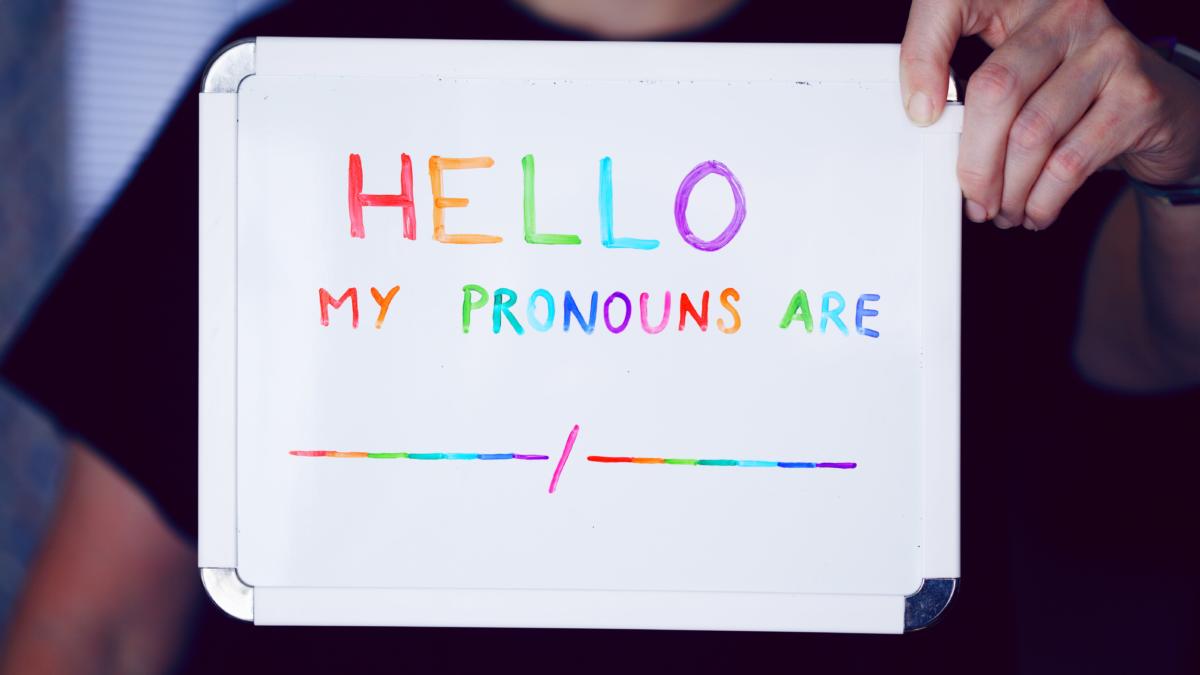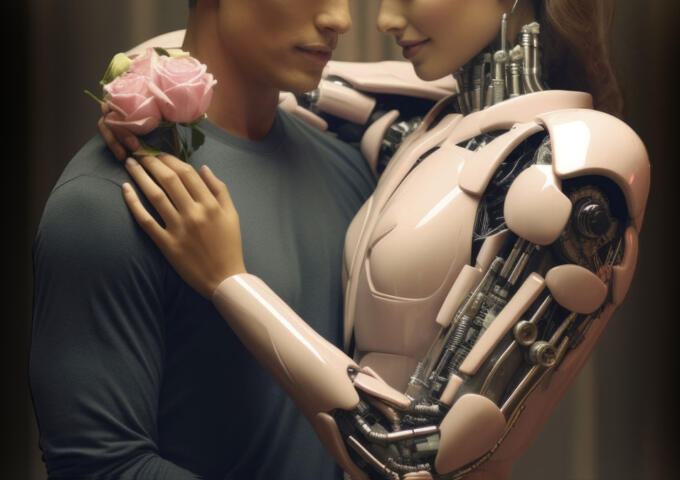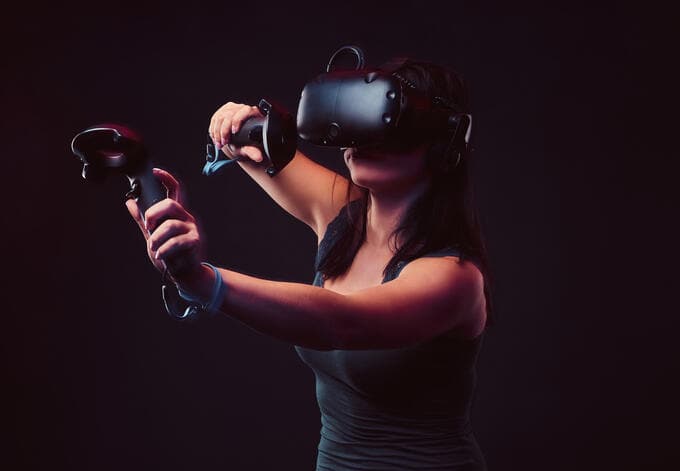“I’m frustrated that my partner calls himself “straight”
Q: “My partner and I have been together for three years, and for the most part things are good. When we met, I was going by she/her pronouns, but about two years ago I came out as non-binary and started to use they/them. My partner – who is a cis man – has been supportive. He had a little trouble with my pronouns at first, but he’s adjusted and makes sure to gently correct others if they misgender me. He’s learned to never refer to me as a woman, and to call me his partner instead of girlfriend, so I feel like I should just be grateful. However, he still refers to himself as straight, which I find frustrating and invalidating. It’s like he doesn’t really understand who I am or is ignoring significant parts of my identity. Should I just be glad that he’s generally supportive and try to get over it? Or is this erasure and something he needs to change?”
What you’ve struck upon are the difficult and painful limitations of the labels we have available for sexuality.
When we ask someone, “what is your sexual orientation?” we often hear back “gay,” “straight,” “bisexual,” or something that describes only one facet of attraction: how my gender compares to the gender of the people I fuck. It says nothing about what that attraction entails, what the sex looks like or how it fits into my romantic life. If your cis male partner says he’s straight, that tells me little about what he finds attractive in a person or the relevance of his sexuality to the rest of him as a person.
Labels are shortcuts – they help me find my people and suggest a little about what my life is like to someone new. Categorization and schemas reduce how hard we have to think about every interaction, so we often use these quick, simple signals. The downside is they don’t leave room for nuance and encourage thinking in stereotypes.
Further, for those of us who realize we’re queer, polyamorous, trans, or otherwise “different” from the cis straight vanilla relationship escalator to married monogamy, we have had time to think about our desires, fears, and hopes around gender and sexuality. Most LGBTQ people spend years contemplating their identities before sharing with others. But for a cis straight person, even one who is open-minded and an ally, there’s a lot of inertia and social pressure that means never having to really contemplate one’s labels.
When your partner says he’s straight, it is not likely an intentional refutation of you. It probably means that he doesn’t spend a lot of time thinking about this or how invalidating that feels to you. It’s probably an indicator that he’s historically been attracted to women. From an apologetics standpoint: one can even make the argument that being hetero is simply attraction to a gender different than your own.
My suggestion is that you speak openly and honestly with this person whom you love, who also cares for you. Share what you feel, ask him what his labels mean to him and maybe what will emerge is that these words aren’t really the summation of your relationship.
>>> Check out some of the best Pride apparel and accessories now at Pride Shack.
In the meantime, I asked non-binary, agender and other folks to share their experiences with this dynamic. Here are a few responses:
“Been there. I have no right to tell anyone what their sexual orientation is regardless of my gender identity. However, it doesn’t feel great when your cis partner identifies as heterosexual. I have also kind of come to terms with the fact that no cis het male will see me the way I see me or want to be seen. They will always want the femme parts of me, they will tolerate/accept the others or fetishize them.” – Astrid
“I’m not overly concerned how my wife or anyone else I care about refers to me. I said it cuz I felt it, it’s true and I love her and wanted to share it.… Also, being in a monogamous marriage, it feels almost irrelevant to me.” – Mx B
“He fully recognizes me as not a woman; in fact, he recognized it faster than I did in many different instances. So I know him using the word ‘straight’ to identify himself isn’t a case of him viewing me as Woman Lite. However, there is such a political tie to queer identities that he does not feel comfortable using terms for marginalized people to identify himself. He is a cisgender white man who does not face any type of oppression for being attracted to me.… But we do know that we love each other, and that we want to be with each other, and we’re both willing to figure out those hurdles together. Our feelings for each other take priority over what labels we use to describe those feelings.” – Floyd
“Personally, I’ve dated cis men who ID as straight. It’s a bit annoying and frustrating at times because it definitely feels a bit invalidating. However, I will say that the ones I’ve dated are generally good about my pronouns, not calling me a girl, and not calling me their girlfriend but a partner rather.” – Hel
“I would probably not date someone who ID’ed as straight. Especially if that was an ID that person felt secure in. That just wouldn’t work for me.” – Jax
“Obviously, a person’s identifiers are their prerogative. Personally, I tend to avoid dating people who identify strongly with straightness or binary gayness because my brain and body do not fit in either of the binary genders/sexes. To me, it feels like in order to be exclusively attracted to one of the binary genders, and also be attracted to me either you are not exclusively attracted to just that binary gender OR you are only seeing part of me/are only attracted to how you see me vs. how I see me.” – Cori
“I need my straight-identifying partners to at least realize that I am an exception to, and exist outside of, their straightness. Their identifiers are their business, but my – relationships – are not straight regardless of my partner.” – Red
“It can be difficult to go through a lot of what goes along with being non-binary with someone who will never fully understand how you’re feeling. He won’t understand how it feels when someone uses the wrong pronouns for you or calls you a girl, or when you can’t find something to wear that you feel good in, or you’re experiencing gender dysphoria. Not to mention, how terrifying it can be to feel like you’re becoming someone else alongside someone who you perceive as having certain expectations of who you’d be. My partner identifying as straight sometimes makes it feel like my partner is exclusively attracted to something I will never fully be. It also means that people make a lot of assumptions about my identity based on my cis-hetero partner…. I suggest that straight cis partners of non-binary and queer people do A LOT of reading and workshops whenever possible.” – Cait
Have a question for Dr. Timaree? Send an email to [email protected].





